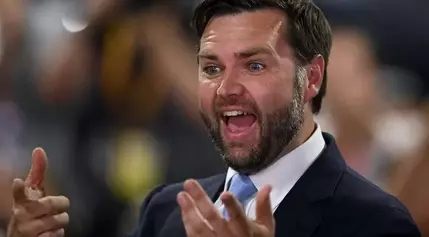News

Vance's Parenting Rhetoric Sparks Controversy: A Closer Look at the Implications
The recent comments made by JD Vance, a prominent political figure, regarding his wife and children have sparked a wave of criticism and concern among the public. Vance's statements, which appear to distance himself from his family responsibilities, have raised questions about his views on parenting and gender roles. This article delves into the implications of Vance's rhetoric and the potential impact it could have on the broader societal discourse.Challenging the Patriarchal Narrative: Vance's Divisive Rhetoric
Distancing Behavior or Genuine Disconnect?
Vance's choice of words in referring to his children as "her kids" has been widely criticized as a concerning "distancing behavior." Experts argue that this language choice suggests a lack of personal investment or ownership in the parenting responsibilities. By not acknowledging the children as his own, Vance is seen as perpetuating a patriarchal model of parenting, where the mother is solely responsible for the children's well-being. This perception is further exacerbated by Vance's failure to refer to his wife, Usha, by name or to mention his own role as a father.Implications for Gender Equality and Family Dynamics
Vance's rhetoric has been interpreted as a reflection of a broader societal issue – the persistent gender imbalance in domestic and childcare responsibilities. By implying that his wife bears the primary burden of caring for their children, Vance's comments reinforce the outdated notion that parenting is primarily a woman's domain. This mindset can have far-reaching consequences, perpetuating the marginalization of women in the workforce and limiting the involvement of fathers in their children's lives.Concerns about Vance's Political Agenda
Vance's comments have also raised concerns about his potential political agenda. As a prominent public figure, his words carry significant weight, and his supporters may interpret his rhetoric as a endorsement of traditional, patriarchal family structures. This could have implications for the policies and legislation he might champion if elected, potentially undermining efforts to promote gender equality and modern, egalitarian family dynamics.The Importance of Inclusive Parenting Narratives
In an era where societal norms are evolving, and the importance of shared parental responsibilities is increasingly recognized, Vance's comments stand in stark contrast to the inclusive and progressive parenting narratives that many families aspire to. By perpetuating outdated gender roles and dismissing the equal involvement of fathers, Vance's rhetoric risks alienating a significant portion of the electorate who value modern, equitable family structures.Fostering a Balanced Approach to Parenting
Ultimately, the controversy surrounding Vance's comments highlights the need for a more nuanced and inclusive approach to parenting. Fathers should be encouraged to take an active role in their children's lives, and the burden of childcare should be shared equally between partners. By embracing this balanced perspective, families can thrive, and societal attitudes can shift towards a more egalitarian and supportive environment for all.

